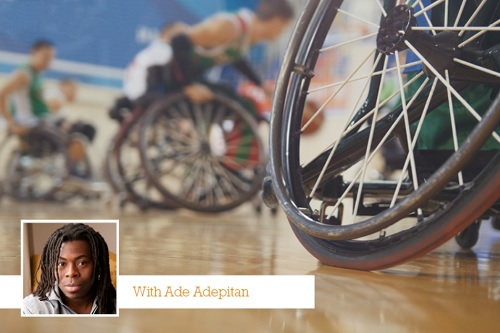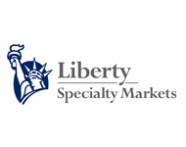“The world wasn’t built with a ramp”: removing barriers to high performance

Authored by Liberty
Reflecting on our Unique Perspective event with Paralympian Ade Adepitan, Phil Hobbs, President & Managing Director of Liberty Specialty Markets discusses inclusion, what has and hasn’t been achieved for visible and invisible disabilities in the insurance world, and how an inclusive policy can lead to a better, more diverse and more effective workplace.
Walt Balenovich, a wheelchair user who has spent decades backpacking across continents, relates the accidents, misadventures and mishaps that he braved in his memorable and funny travelogue Travels in a Blue Chair: Alaska to Zambia Ushuaia to Uluru. “The world wasn’t built with a ramp”, he says, reflecting on the barriers and additional challenges he faced in his travels.
Balenovich’s comment struck me as succinctly encapsulating the adversity faced by many with a disability in the working world. Earlier this year at LSM, we hosted Ade Adepitan, a wheelchair basketball player, TV presenter, author and Paralympic star. His moving talk on his background, and the barriers he faced from early on in life to becoming an athlete, was a much-needed motivator for an honest, direct and often difficult conversation about workplace accessibility.
Ade’s achievement, becoming a world-renowned sportsperson, and Balenovich’s in travelling around the world are still sadly the exception. For many, disabilities, visible or invisible, can be a significant barrier to employment and high performance in the workplace.
Adjusting our way of work
Not everyone aspires to be a Paralympian or travel the world. What many want is a gainful, challenging and well-remunerated career. Insurance has much to offer for young people looking for employment, and broadening access to our industry has been a focus for many in our industry over the past decade. Initiatives such as ‘Dive In’ have explored the barriers to employment or progression, raising awareness across the globe. At LSM we are making progress towards a more diverse workforce through a broad range of initiatives to promote inclusion.
But we have to be honest and admit, as an industry, that making reasonable adjustments for disabilities visible or invisible, has not been a particular strength. And that needs to change.
Ade Adepitan put it simply: “Polio didn’t make me disabled. Being in a wheelchair doesn’t make me disabled” he said, “but an obstacle in my way – like a stage without a ramp - that’s what makes me disabled. We should try to remove life’s obstacles, for everyone”.
Inclusion requires effort and a diverse range of measures: from the physical changes needed to make our offices disability friendly, to ensuring those with chronic pain, for example, have access to the latest ergonomic solutions for activities non-disabled employees take for granted. The sheer complexity of offering comprehensively disabled-friendly employment is often daunting, but that’s not a reason to shy away from tackling the issue.
The financial services industry is frequently better placed than most industries to ensure accessibility, with city centre locations, contemporary offices built with the latest facilities and technological solutions.
However, while modern facilities have generally improved accessibility, we have significant challenges ahead of us to ensure that barriers to effective work for those with invisible disabilities are tackled. HR departments have always done their best to fulfil their duties and obligations to employees. Recently, for example, work-from-home surveys have tested desk setups in home offices to ensure flexible working does not make certain conditions worse. Modern technology can address issues around physical injuries such as repetitive strain injury or hidden conditions like dyslexia, but we need comprehensive programmes using all the resources at our disposal to support everyone effectively.
LSM also ensures all team leaders are provided with mandatory training to support diverse teams, including training on how to support those with hidden disabilities. We have also recently launched “Able Matters” – an employee-led network focused on accessibility.
But although we are clearly making progress, I have come to believe this is not enough, and continued and re-enforced leadership and management sponsorship is required to ensure accessibility and inclusion is a priority.
Inclusion is its own reward; but it also comes with a return on investment
The arguments for inclusion, and a diverse workplace in general, are very well-rehearsed and conclusive. A broader talent pool leads to a diversity of views and better decision-making, thus to better results and a happier workforce. If we offer our people the best, most welcoming place to work, they have a better chance to reach their full potential.
The insurance industry has long highlighted the struggle to attract and retain diverse talent. Improving accessibility is a way to enable new talent to enter the marketplace and enable existing employees to perform at the highest level. But it is also a good in itself: recognising that everyone deserves a fulfilling life and career, not just those who become world-famous athletes or travellers, is the start. And then making the adjustments that enable our colleagues to succeed when otherwise they couldn’t is the logical conclusion. They’re called “reasonable adjustments” because they are eminently so.
Our team is always open and ready to talk to employees about their adjustment needs. We are working to make our office more disabled friendly, whether it’s a physical disability or not, whether it’s visible or invisible, and whether it’s straightforward or complex. We will find a solution. That is the meaning of inclusion, in which I believe fundamentally.
I was moved by Ade’s speech and glad we were privileged enough to hear from him. However, being moved is not enough. The next step is to work within our company and within our market to make inclusion, in all its complexity, a reality. The world wasn’t built with a ramp. But we do now have the tools to build one. We should and will.
About Liberty
Liberty Specialty Markets offers specialty and commercial insurance and reinsurance products across key UK, European, Middle East, US and other international locations.
We provide brokers and insureds with a broad range of products through both the Company and Lloyd’s markets and have over 1,700 staff in approximately 65 offices. Liberty Specialty Markets was established in September 2013 bringing together Liberty’s company, syndicate and reinsurance operations into one combined operation, composed of three business units: Commercial, Specialty, and Reinsurance (Liberty Mutual Re). This integrated approach means brokers and clients can benefit from our global reach and operating efficiencies.
Liberty Specialty Markets is part of global insurer, Liberty Mutual Insurance Group, a diversified global insurer, formed in 1912 and headquartered in Boston, Massachusetts. Liberty Mutual is the 5th largest global insurer based on 2017 gross written premium, with over 50,000 employees in 30 countries and economies around the world. Our purpose is to help people embrace today and confidently pursue tomorrow. The promise we make to our customers throughout the world is to provide protection for the unexpected, delivered with care. We achieve this by offering a full range of personal, commercial, and specialty Property & Casualty insurance coverages. Our customers’ trust has earned us the 68th spot on the Fortune 100 list of largest corporations in the U.S., based on 2017 revenue.

